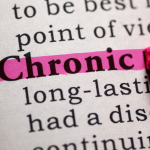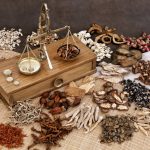The Importance of Gut Health- Part 4
JAMES SENSENIG, ND
Treatments for GI Imbalances
Reduce Stress, Improve Lifestyle
The most obvious ways to correct gut problems are looking at how and when we eat, reducing stress, changing our lifestyle by slowing down, and eating under the right circumstances. We need to be in a parasympathetic state for optimal digestive function. If you do not have enough time to sit down and quietly eat a meal, then wait until you do. Eating on the run is not conducive to good digestion.
Exercise is also very important for gut function, not just because it is stress-reducing and relaxing (unless you are in extreme training for something). Additionally, the jostling around of your gut in your abdomen stimulates peristalsis.
Diet/Fiber
It is remarkable how many people suffer from constipation. The best fiber for correcting constipation and restoring normal bowel movements is the fiber in our food, especially from fruits and vegetables.
A very difficult disease to treat is Parkinson’s disease. People with Parkinson’s have issues with constipation, sometimes having only 1 bowel movement a week. Correcting the gut function to include better bowel movements is imperative. It has been found that as the frequency of bowel movements become more normal (at least once a day), other Parkinson’s disease symptoms improve; in other words, there is a direct relationship. I suspect it is the dopamine. Sometimes these patients feel so much better, they wonder if they actually still have Parkinson’s disease. If 70-80% of our dopamine is made in the gut, and your gut is full of impacted feces that have been there for a week, you certainly are not digesting and eliminating properly, and that can worsen a variety of neurological diseases.
Enzymes
Many people are on digestive enzymes at some point. Why do we need enzymes? We should be making our own. We are the only mammal that cooks its food. Cooking kills the intrinsic enzymes in the food, which in turn requires us to use more of our own digestive enzymes to digest the food whose enzymes we have just destroyed.
Many people will suggest that our enzyme pool is limited and that it decreases as we get older. We may run out of enzymes at some point. But that may be a function of the way we live. We may be running out of enzymes because we are requiring an extraordinary output of enzymes due to eating cooked food. This goes back to the vegetarian topic. It might be that vegetarians and vegans appear to be healthier because they have more enzymes and those enzymes are anti-inflammatory and anti-aging.
Probiotics
You have to put the good stuff back in your gut. Any indigenous society on this planet has some kind of cultured food that they have developed. This may be yogurt, sourdough bread, kimchi, shrimp paste, etc.
There are all kinds of products all over the world that are specifically designed to replace bacteria. During human evolution, the people that developed these ferments had no idea about microbes, but they knew something necessary and beneficial came from eating slightly spoiling foods.
Every proprietary blend of probiotics is just that, whether it is a probiotic capsule, a probiotic powder made by one of our many suppliers in natural medicine, or beer, wine, sauerkraut, pickled ginger, kimchi, whatever.
Each home, family, or manufacturer has their own favorite starter, blend, or particular patented brew. If you drink the same beer every day, you are getting the same bacteria every day; if you drink the competing brand, you may be getting others that aren’t in your brand. When you change it up, you may find you get better results.
HCl, Precursors, Zinc, and Salt
It is amazing just how many people have low hydrochloric acid production. There are modern ways of testing it, but the way that was taught 100 years ago works just as well and costs a whole dollar to do.
Give somebody glutamic or betaine hydrochloride in ascending doses. One capsule usually contains about 500-750 mg. Take 1 capsule with the largest meal of the day. If there is no heartburn, take 2 the next day, and then take 3 the next day. The more HCl that a person can tolerate with their meal, the lower their own acid production is. That is a person who can benefit from betaine HCl, some bitters, or some other way of stimulating hydrochloric acid production.
Zinc is a required cofactor in the elaboration of hydrochloric acid. So, people who have low zinc levels will have trouble making HCl. However, with low HCl, you cannot absorb zinc very well. This is another case of the dog chasing its tail.
It may be no coincidence that we see more hypochlorhydria and achlorhydria in our culture now, since the dominant school of medicine has been telling people to avoid salt for the last 30 years. Sea salt is nothing more than minerals; it is all the trace minerals that are found in the ocean, including sodium chloride. A chloride ion is needed to make the hydrochloric acid. It has been speculated in natural medicine circles that a salt-free diet or low-salt diet actually exacerbates hydrochloric acid deficiencies.
Cholagogues
The benefits of cholagogues should not be underestimated. Cholagogues not only stimulate the liver to secrete bile; they also increase the elimination of waste because bile is the medium by which toxins are excreted. Cholagogues can also help reduce fatty liver and primary sclerosing cholangitis.
Bile has a gentle laxative effect, which is another benefit of cholagogues. One effective intervention for constipation is a little bit of magnesium and a little bit of a cholagogue and a lot of probiotics.
Gut Healing
Glutamine is a preferred energy source for the enterocytes; therefore a lot of people are using glutamine powder in fairly high doses to reduce inflammation in the gut and decrease leaky gut. There is a proprietary fish protein on the market that is high in glutamine, rich in minerals, and includes most of the amino acids. I’ve found this product [editor’s note: bonito flakes] works far better for inflammatory bowel disease and leaky gut than glutamine alone.
When the gut is inflamed, demulcents like slippery elm and marshmallow root are great for lubricating the intestinal lining; they have a mucus-imitating effect in the gut.
Hiatal Hernia Correction
If you are doing any kind of physical medicine in your practice, you will want to check for hiatal hernia in patients who complain of GERD symptoms. Even if you do not know how to reduce or correct a hiatal hernia, you should still have some suspicion about it and have the person get checked for it by another practitioner who knows how to do it.
Lindlahr & Causes of Disease
If you look at Lindlahr’s teachings, he tells us that there are 3 legs of the stool upon which health is built:
- Providing the body with the nutrients that it needs
- Removing the waste
- Increasing vitality
Lindlahr defines disease as imbalance, so he asks what is causing the imbalance. He talks about the effects of violating the laws of Nature.
- The first category he speaks of is the abnormal composition of the blood and the lymph, which is the stream of life, the river of life. The cells have to be close enough to the nutrient stream to be able to be nourished. The blood and lymph carry those nutrients to the cells. Abnormal composition of the blood and lymph means that the cells are not getting what they need. In 1913, they did not know about all these essential nutrients that have since been identified. They did not know about vitamins; they are not mentioned anywhere in Lindlahr’s work or his predecessors’ work. But they did talk about minerals, which they had identified as being essential nutrients, though certainly not all of the minerals that we know about today.
- The second category that Lindlahr discusses is accumulation of wastes. He talks about metabolic waste, which is a normal byproduct of biological functioning. And he talks about wastes or toxins that he called “disease products.” These are things like pus and mucus, which are the result of a disease or an inflammatory reaction.
- The third category of imbalance is exogenous, or environmental, toxins. Here again, our gut is the route by which we eliminate most of our toxins. We do eliminate some through our breath and skin, but the major route of elimination of toxins that accumulate in our system is the gut.
Assimilation is the flip side of elimination. If you are not assimilating properly, you will not digest properly, you will not have proper peristalsis – you won’t have enough bile in your gut to have a peristaltic reaction – and you won’t have the right bacteria to stimulate normal function and carry out detoxification. In other words, without proper assimilation, elimination will also be abnormal.
Two Questions
The antibiotic that is often recommended for SIBO, when natural agents don’t seem to be getting rid of the bugs in the small intestine, is rifaximin. Because it is not systemically absorbed, do you think rifaximin might be okay?
I suppose it might be okay if you are practicing medicine, but if you are practicing naturopathy, you have to question the wisdom of killing bacteria. It has been suggested that if conventional medical doctors truly understood the importance of the bacteria in our gut, they would never use antibiotics unless it was truly a life or death situation.
In my opinion, I can’t back this up scientifically. It’s philosophically informed that the body knows how to handle these bacteria and organize them under the right circumstances, at the right time and in the right place. We naturopathic doctors should not be using antibiotics as the conventional system is. For conventional docs, antibiotics are one of their few effective tools; however, they’ve been over-used or used willy-nilly without thoughtful consideration.
What conventional docs are doing here is using the antibiotic to kill a specific bug, but the drug ends up killing all bacteria. What about afterwards, when you need to get the right dynamic mix of probiotics back into the intestinal tract?
Because conventional doctors are working with that mechanistic, flat-earth paradigm, they don’t have any other tools. An important piece that’s often left out of the discussion is intestinal environment. What’s the pH in the gut? Does the person with SIBO have an abnormal intestinal pH and therefore an abnormal environment?
If you use antibiotics to kill off the bugs, what’s going to keep them from growing back? Just like killing off algae in a pond, they’re going to come back unless you revivify the pond. You have to oxygenate the water and change the pH, or you are going to continually have a battle with algae, just like you do in a fish tank. Killing bugs in the small intestine without changing the environment is a losing proposition. As an example, H pylori is a commensal organism; if it is causing a “problem” it’s only because it’s over-represented because of another imbalance. H pylori, in a proper ratio to other gut bugs, is not a pathogen.
How long does someone typically stay on hydrochloric acid if they are cleaning up the diet, they’re managing their stress, eating when relaxed, and they’re getting the toxins out? Is this something they can discontinue at some point?
Yes, if they make those changes that you just mentioned, they will be able to discontinue HCl supplementation. But if not, they are going to be stuck with taking hydrochloric acid. Obviously, as a naturopathic doctor, you want to deal with all those issues – the size of meals, timing, stress – taking a holistic approach.
It’s my opinion that with low acid function, one is less able to acquire the cofactors needed to make the hydrochloric acid in the first place. So there is something about taking HCl that might allow you, once again, to make your own hydrochloric acid, although I cannot show you any scientific proof of this hypothesis.
Typically, when you are using 500-750 mg capsules, the average patient will tolerate 1 or 2 doses of betaine HCl with a meal. I have a patient who continued to feel better as the dosage was increased; she is now taking 8-10 capsules with each meal. That sounds like a lot to me, but this person is having no troubling symptoms.
The person who is on a smaller dose to stimulate their digestion will be able to wean off it a lot sooner than the person who is on a higher dose. I have no idea what the upper limit is for betaine HCl. A 500 mg dose is a very small amount of acid. I tell my patients that I don’t want them to have a 4-alarm fire, so that’s why we are doing this incrementally.

James Sensenig, ND was a 1978 graduate of NCNM in Portland, OR. For over 40 years he maintained an eclectic practice in Hamden, CT. Over the years, Dr Sensenig held prominent positions in the various naturopathic colleges and the AANP. A champion of classical naturopathic medicine, Dr Sensenig received an Honorary Doctor of Naturopathic Philosophy degree from CCNM, and received numerous awards for his dedication to teaching the principles of naturopathic medicine.








